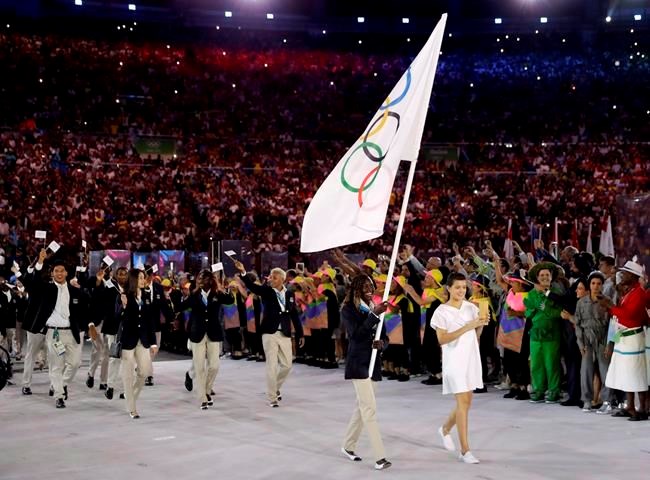LONDON — When Rose Nathike Lokonyen crouches at the start line of the 800 metres on Thursday, her race will be a victory before the starting gun even sounds.
Her blue race singlet will read "Refugee Team" and she'll represent a global community some 65 million strong, her very presence at London Stadium a message to the displaced about hope, and to the world, about peace.
"Now we are the voices of (refugees), we can be the ambassadors of the refugees, we represent them all over the world so that they have courage, not to be isolated," said Lokonyen, who speaks so softly one must lean in closely to hear her. "(People) say that we are just refugees, we cannot do anything.
"(I say) 'You have to have courage, also have hope. You can do something better in life.'"
Lokonyen is one of five athletes on the refugee team that is making its world championship debut. She became the face of the refugee squad at last year's Rio Olympics, when she carried the team's flag into Maracana Stadium for the opening ceremonies. The warm cheer they received was louder only for host Brazil.
The 22-year-old Lokonyen was a young girl when her family was forced to flee war-torn South Sudan, squeezing into the back of a truck headed to the Kakuma Refugee Camp in northwestern Kenya. During their terrifying escape, Lokonyen stumbled across the bodies of two grandparents.
Kakuma is the second largest refugee camp in the world. Bursting at the seams, it's the size of a small city with some-200,000 residents.
Lokonyen's parents returned to South Sudan in 2007, leaving her at the camp to care for five younger siblings. With little to do at Kakuma but attend school and play soccer, Lokonyen ran — in bare feet, on scorched earth.
A year before Rio, she met Tegla Loroupe, who handed her a lifeline. The Kenyan was the first African woman to win the New York Marathon in 1994, and racing barefoot over 10,000 metres, she won the Goodwill Games in '94 and '98, and bronze at the world championships in '95 and '99.
Loroupe petitioned the International Olympic Committee to allow refugees to compete in Rio, and was honoured as the United Nations Person of the Year for 2016. Her Peace Foundation holds annual "peace races" in Kenya to foster harmony among warring communities. In late 2015, she established an athletes training centre in Nairobi, to which she invited the best refugee runners.
"As a former athlete, I know what it means for somebody who never had opportunity," Loroupe said, after the team's training session Monday morning. "These kids, their life is difficult, so for me it is just to open the door for them to see if they can be successful."
Lokonyen was hand-picked from Kakuma to live at Loroupe's training centre, which features the relative luxuries of electricity, three meals a day, and proper running shoes, provided by the team's sponsor and Swiss sporting goods company On.
Anjelina Nadai Lohalith is also based there. Lohalith, who raced the 1,500 in London but didn't advance out of her heat, fled South Sudan with a relative in 2002, when she was just eight. Evening raids from rival tribes forced her family to sleep in the bushes, and so her parents organized her escape to Kenya. She hasn't heard from them since.
"There are so many refugees all over the world, 65-point-something (million), and in sport it's not only winning the golds, it's to bring people together, it's to create peace and share many ideas," Lohalith said. "That is the goodness of sport."
Lohalith said, had she stayed in South Sudan, she had faced a lifetime of herding cattle and fetching firewood. Instead she attended high school at Kakuma, and hopes to earn a university scholarship and become a doctor.
She believes her running "opens the doors for other refugees."
"Anybody can become a refugee, I or you. You never know what might happen tomorrow," she said. "(Refugees) have dreams just like anybody can have, they want to achieve big things in their lives. Most of the time they say refugees are terrorists or criminals, just forgetting they are human beings."
Often with problems much greater than most human beings. Loroupe said runners often receive bad news from home.
"They get a call, so-and-so has been killed," Loroupe said. "To lose family, it (hurts) everybody. We grew very tight together."
Loroupe grew up one of 25 children — her father had four wives — and spent her childhood working the fields and herding cattle in northern Kenya, an area plagued by conflict, before becoming a world-class athlete.
"I see myself in them," Loroupe said of her athletes.
Ahmed Bashir Farah, a 19-year-old from Somalia, didn't advance out of his heat in the 800 metres. Kadar Omar, a refugee from Ethiopia, races the heats of the 5,000 metres on Wednesday, while Dominic Lokinyomo of South Sudan runs the first round of the 1,500 on Thursday.
Lori Ewing, The Canadian Press
